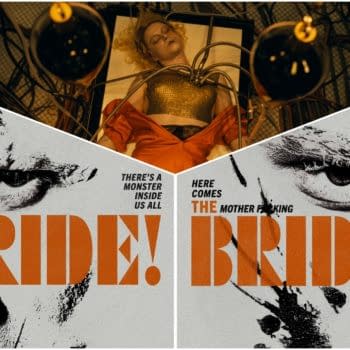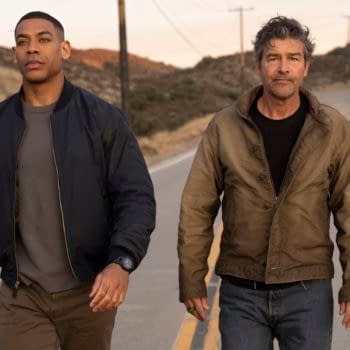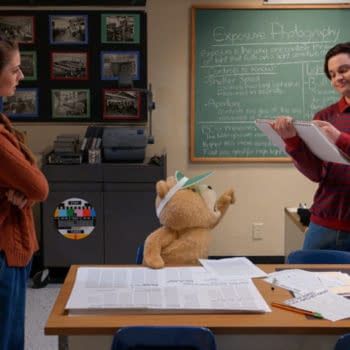Posted in: Deadpool, Fox, Movies | Tagged: deadpool 2, film, fox
Deadpool 2 Writers Didn't Know What This Common Trope Was [Spoilers]
The other day we posted an article talking about the sexist trope that Deadpool 2 relies on. It seems we weren't the only ones who made the connection, since Vulture decided to ask writers Rhett Reese and Paul Wernick about it. However, to get into it is a huge spoiler, so this is your spoiler warning if you haven't seen the movie yet.
.
.
.
.
.
.
.
.
.
.
.
.
.
.
.
.
.
In our article we not only explained what the trope "woman in refrigerator" is but also how the death of Vanessa early on in the movie is a perfect example of it. As we said we aren't the only ones who saw this as a "fridging", and Vulture asked Reese and Wernick about it. It seems, for how familiar they are with this genre, they didn't know what this common trope is.
"I would say no, we didn't even think about it. And that was maybe our mistake, not to think about it. But it didn't really even occur to us." Indeed, they weren't aware of this genre of criticism. "We didn't know what fridging was," Reese says.
Reese goes on say that Wade is more better when he's lost "everything" instead of saving everyone. There were scripts where Vanessa didn't die and she just left him, but instead they decided to kill her.
"In the very first drafts of the script, Vanessa didn't die," Reese continues. "She ended up breaking up with Deadpool, and he was trying to earn her back. Then I think at some point somebody just said, 'Y'know, Deadpool kind of works best when he's had everything taken away from him, when he suffers.' So the thought was maybe we can really, really engender great suffering for him by having his line of work be the thing that costs Vanessa her life."
Reese goes on to say that they always thought they could bring her back because of the way the plot works, but he demonstrates that it didn't even occur to either of them that this could be an issue.
"We always had in our back pocket that we could always bring [Vanessa] back if necessary," says Reese. "So, we ran with that. And maybe that's a sexist thing. I don't know. And maybe some women will have an issue with that. I don't know. I don't think that that'll be a large concern, but it didn't even really occur to us."
Wernick makes another faux pas by referring to Vanessa as the only "thing" Wade cares about instead of the only "person".
"I would say, in our defense, the only thing that really is important, the only thing that Deadpool cares about, is Vanessa," he says. "So if you're doing a movie where you are trying to get Deadpool at his lowest, to take away everything from Deadpool at the very beginning, the only thing to really take away from him is Vanessa."
He tries to defend that it wasn't consciously sexist but says that both Vanessa's and Cable's families were killed for their character motivation, which is the textbook definition of the trope.
"I know it wasn't consciously sexist," Wernick adds. "It may appear that way as the film progresses and Cable loses his family as well, but again, the desire was to give a motivation to both Cable and to Deadpool, and have it be a parallel motivation that they both lost their family, and they're both trying to kind of find their way in the world without them."
Reese makes the claim that they did pay attention by bringing in different female characters.
"I also think we definitely paid attention to trying to fill the movie with a diverse group of strong female characters, interesting, different female characters," says Reese. "Whether it's Domino, or Negasonic Teenage Warhead — and Vanessa, herself, obviously, is certainly that. So we've definitely made a point of not having this just be a testosterone-fueled thing."
The fact of the matter is the movie is still extremely male heavy. Vanessa dies before the opening credits and is used as a plot device for pretty much the entire movie. Negasonic and Yukio both hardly get any screen time at all. Domino is great character, but she is a perfect example of "The Smurfette Principle" or the lone woman in a group of men. Reese and Wernick deserve credit for the way they handled Negasonic and Yukio's relationship, but as for treating the women in their story as more than a glorified cameo or a plot device? They completely failed on that front.
Summary(?): After surviving a near fatal bovine attack, a disfigured cafeteria chef (Wade Wilson) struggles to fulfill his dream of becoming Mayberry's hottest bartender while also learning to cope with his lost sense of taste. Searching to regain his spice for life, as well as a flux capacitor, Wade must battle ninjas, the yakuza, and a pack of sexually aggressive canines, as he journeys around the world to discover the importance of family, friendship, and flavor – finding a new taste for adventure and earning the coveted coffee mug title of World's Best Lover.
Deadpool 2, directed by David Leitch, stars Ryan Reynolds, Morena Baccarin, T.J. Miller, Josh Brolin, Brianna Hildebrand, and Zazie Beetz. It's out now.


![Deadpool 2 Writers Didn't Know What This Common Trope Was [Spoilers]](https://mlpnk72yciwc.i.optimole.com/cqhiHLc.IIZS~2ef73/w:auto/h:auto/q:75/https://bleedingcool.com/wp-content/uploads/2017/07/big-spoiler.jpg)
![Deadpool 2 Writers Didn't Know What This Common Trope Was [Spoilers]](https://mlpnk72yciwc.i.optimole.com/cqhiHLc.IIZS~2ef73/w:350/h:146/q:75/https://bleedingcool.com/wp-content/uploads/2018/05/deadpool-2-vanessa.jpg)
![Deadpool 2 Writers Didn't Know What This Common Trope Was [Spoilers]](https://mlpnk72yciwc.i.optimole.com/cqhiHLc.IIZS~2ef73/w:350/h:233/q:75/https://bleedingcool.com/wp-content/uploads/2018/05/deadpool-2-negasonic-yukio.jpg)
![Deadpool 2 Writers Didn't Know What This Common Trope Was [Spoilers]](https://mlpnk72yciwc.i.optimole.com/cqhiHLc.IIZS~2ef73/w:350/h:146/q:75/https://bleedingcool.com/wp-content/uploads/2018/05/deadpool-2-domino.jpg)












